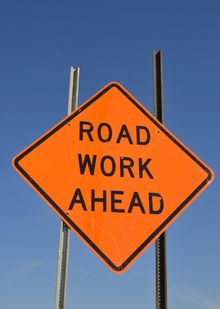
During the summer, road crews across Alaska take advantage of the nice weather to perform much-needed repairs and improvements. As crucial as road construction can be, personal injury attorneys also know that these areas present hazards that can lead to catastrophic accidents. Below are a few tips for staying safe if you’re approaching road construction.
Tips for Driving Through Construction Zones
1. Slow Down on Unpaved Surfaces
During construction, road crews often open a portion of the road after stripping off the asphalt. At normal speeds, the uneven surface makes it easy to lose control, so slow down and follow the posted speed limits.
2. Look for Construction Signs
 In construction zones, lanes might suddenly close or reopen, or some areas might have radically uneven areas. If you see construction ahead, look for signs indicating how traffic should flow and what hazards you might encounter.
In construction zones, lanes might suddenly close or reopen, or some areas might have radically uneven areas. If you see construction ahead, look for signs indicating how traffic should flow and what hazards you might encounter.
3. Watch Out for Other Drivers
It only takes one careless driver to cause an accident, especially in construction zones where cars can quickly pile up. Be vigilant, and watch for other motorists who are driving erratically or aggressively.
4. Follow Directions
On many construction projects, flagmen or pilot cars are on hand to manage traffic and prevent accidents. Follow their directions, and don’t proceed until they indicate it’s safe to do so. If the project features a pilot car, follow at a safe distance and don’t deviate from the course the vehicle ahead of you is taking. If you get injured but didn’t follow directions, a personal injury attorney will have a harder time winning your case.
If you’ve been hurt by a negligent driver or a poorly managed construction project, turn to the personal injury attorneys at Burglin & Doxey, PC. Their accomplished legal team has been serving Fairbanks, Alaska, drivers for over 35 years, establishing themselves as skilled personal injury attorneys dedicated to their clients. Visit their website for more on their wide range of legal services, or call (907) 456-4020 to speak with a member of their team.
These articles are for discussion purposes only. For legal advice, contact a qualified attorney.
About the Business
Have a question? Ask the experts!
Send your question

